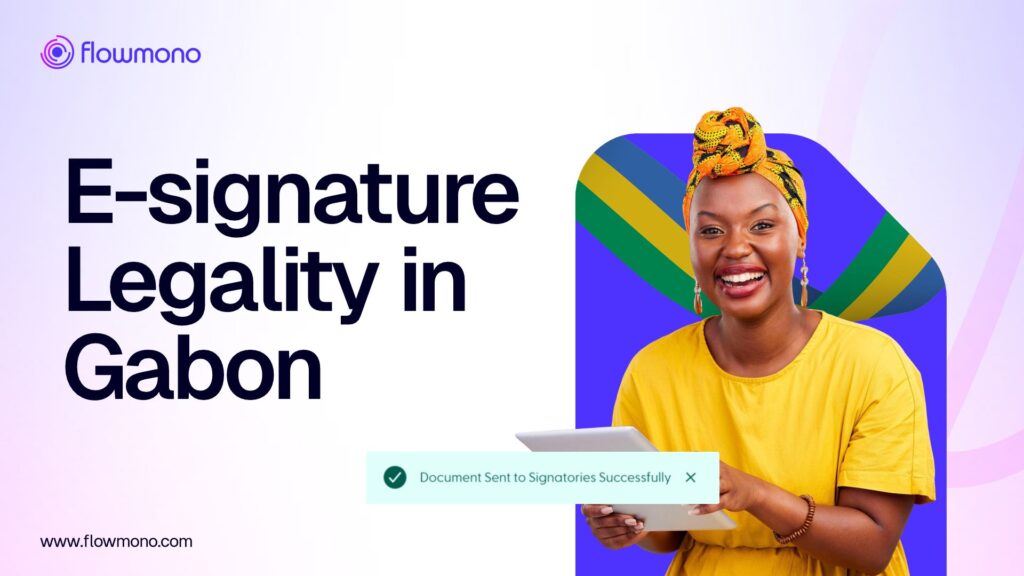
Gabon has progressively enhanced its digital legal infrastructure to support e-governance, secure electronic transactions, and digital signatures. As part of this evolution, the country enacted a dedicated law in 2021 to regulate electronic commerce and transactions, affirming the legal validity of electronic signatures and documents. This framework aligns with regional (CEMAC) and international standards promoting digital trust and interoperability.
Legal Framework in Gabon
Law No. 025/2021 of 28 December 2021, governing electronic transactions in the Republic of Gabon, is the cornerstone of legal recognition for electronic signatures and documents. This law provides broad applicability to electronic exchanges, including administrative, commercial, and legal acts, while preserving constitutional protections on privacy.
Accreditation of Certification Services: Article 6 of the law authorizes the regulatory authority to accredit certification service providers (CSPs) authorized to issue electronic certificates under secure standards.
Legal Validity and Admissibility: Articles 82 and 119 specify that electronic documents and signatures carry full evidentiary weight, as long as they maintain integrity and verify identity. They cannot be dismissed as legally ineffective solely because they are electronic.
Exemptions: Article 3 excludes certain categories, such as those related to gambling and securities law, from the scope. Privacy concerns are acknowledged, and some administrative acts involving personal data are exempted to protect citizens’ rights.
Documents That Can Be Signed Electronically
Gabon’s law authorizes the electronic signing of a wide range of transactions:
1. Administrative Acts: Tax filings, customs, licensing, and routine governmental procedures are permitted to be executed electronically.
2. Commercial and Contractual Agreements: Sale contracts, purchase orders, service agreements, NDAs, board resolutions, invoices, and employment contracts.
3. E-Commerce and Consumer Documents: Digital contracts, receipts, and electronic communications fall within the scope of the law.
Law 025/2021 fosters a digital economy by removing technical barriers to validate documents electronically where statutory forms permit it.
Documents That Cannot Be Signed Electronically
Certain sensitive or formal transactions remain excluded from electronic execution:
1. Gambling transactions under laws regulating monetary stakes.
2. Certain administrative acts or documents that handle sensitive personal data, unless constitutionally reconciled with privacy protections.
3. The law also allows later regulations to define further exclusions, ensuring constitutional rights and public interest are protected.
Notable Legal & Regulatory Developments
a. Enactment of Law 025/2021
This law formally establishes the legal equivalence between electronic and paper-based documents, aligning Gabon with regional (CEMAC) directives on digital commerce. It enables secure e-signatures and digital records across sectors.
b. Cybersecurity Law Updates
In July 2023, Law No. 027/2023 was promulgated, reinforcing cybersecurity, regulating cryptographic tools, and requiring providers to report technical characteristics to authorities—ensuring the safe deployment of digital certificates.
c. Tax Digital Modernization
In 2022, Gabon integrated electronic documents and signatures into tax administration. Electronic correspondence and signatures between tax authorities and taxpayers now have the same legal effect as paper-based equivalents, improving transparency and efficiency.
Practical Implications & Sector Usage
1. Government Services: E-filing of taxes and customs documents via digital platforms now relies on legally valid electronic signatures.
2. Banking and Payments: As Gabon explores taxation on mobile money and electronic transfers, stakeholders must ensure compliance with encryption and certification standards for digital payments.
3. Private Sector Use: Businesses and legal professionals can execute contracts, negotiations, and corporate filings digitally when all reliability criteria are met.
The law supports electronic authentication via accredited CSPs and secure infrastructure supervised by Gabonese regulatory bodies.
Disclaimer
The information on this site is for general information purposes only and is not intended to serve as legal advice. Laws governing the subject matter may change quickly, so Flowmono cannot guarantee that all the information on this site is current or correct. Should you have specific legal questions about any of the information on this site, you should consult with a legal practitioner in your area.
Conclusion
Gabon’s legal ecosystem now robustly supports electronic signatures as valid and enforceable instruments across broad administrative and commercial domains. While specific categories remain excluded, the modern legal structure enhances digital transformation, operational efficiency, and legal certainty. With continued regulatory oversight around cybersecurity and certification, Gabon is well-positioned to expand the legal scope of digital transactions.
References
- Journal Officiel: Loi N° 025/2021 du 28 décembre 2021 regulating electronic transactions in Gabon.
- Journal Officiel: Loi N° 027/2023 du 11 juillet 2023 on cybersecurity and digital data protection.
- Le Nouveau Gabon: Article on electronic documents in fiscal transactions.
- UNCITRAL Model Law & Electronic Communications Convention for harmonization principles.
![]()
